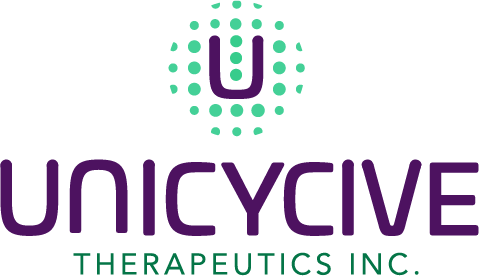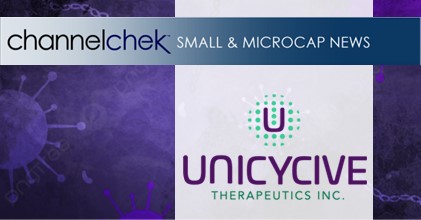
Research News and Market Data on UNCY
July 24, 2025 8:00am EDT Download as PDF
OLC was well-tolerated and enabled serum phosphate control in over 90% of patients with a low pill burden
LOS ALTOS, Calif., July 24, 2025 (GLOBE NEWSWIRE) — Unicycive Therapeutics, Inc. (Nasdaq: UNCY), a clinical-stage biotechnology company developing therapies for patients with kidney disease (the “Company” or “Unicycive”), today announced the publication of pivotal trial data describing the safety and tolerability of oxylanthanum carbonate (OLC) in chronic kidney disease (CKD) patients on dialysis in the Clinical Journal of the American Society of Nephrology.
The publication, entitled “A Phase 2 Clinical Trial of Oxylanthanum Carbonate in Patients Receiving Maintenance Hemodialysis with Hyperphosphatemia,” examines the safety and tolerability of OLC at clinically effective doses with a goal serum phosphate concentration of ≤5.5 mg/dL. Eighty-six patients were treated with OLC in this open-label single arm Phase 2 study. At screening, only 59% of patients had serum phosphate levels of ≤5.5 mg/dL (phosphate control). OLC was well tolerated and enabled serum phosphate control in >90% of patients with a low pill burden (two-thirds of patients receiving three or fewer tablets/day). Pharmacokinetic analysis showed that systemic absorption of OLC (measured as lanthanum) was minimal to none in CKD patients.
“With the favorable tolerability, strong efficacy and low pill burden highlighted in this prestigious publication, we continue to believe that OLC has the potential to offer patients a new option that could help improve adherence to treatment over time,” said Shalabh Gupta, MD, Chief Executive Officer of Unicycive. “This pivotal study was the final clinical evidence needed for our NDA package. We continue to collaborate closely with the U.S. Food and Drug Administration as we address their outstanding manufacturing questions and align on a path forward to bring OLC to this underserved patient population as quickly as possible.”
Key Findings:
- More than 90% of patients with hyperphosphatemia taking OLC achieved effective phosphate control.
- Two-thirds of patients required three or fewer OLC tablets per day to achieve target serum phosphate levels, with most requiring no more than one tablet with each meal.
- OLC was well tolerated in CKD patients on dialysis. The most common treatment-related adverse events were gastrointestinal (9% diarrhea; 6% vomiting) and only 4% of patients discontinued treatment due to treatment-related adverse events.
“Despite the various treatment options available, there remains a significant need in managing hyperphosphatemia, which heavily impacts people with chronic kidney disease on dialysis,” said Dr. Pablo Pergola, MD, PhD, Research Director, Clinical Advancement Center, Renal Associates, P.A., and principal investigator of the trial. “These data add to the growing body of clinical evidence supporting the potential of OLC as an innovative treatment option, demonstrating effective phosphate control and reducing pill burden. OLC’s unique profile offers a promising alternative with favorable tolerability, potentially transforming the standard of care for patients.”
The full publication can be accessed here and on the Presentations & Research page of Unicycive’s website.
About Oxylanthanum Carbonate (OLC)
OLC is an investigational oral phosphate binder that leverages proprietary nanoparticle technology to deliver high phosphate binding potency, reducing the number and size of pills that patients must take to treat hyperphosphatemia in patients with chronic kidney disease (CKD) on dialysis. Its potential best-in-class profile may have meaningful patient adherence benefits over currently available treatment options as it requires a lower pill burden.
Unicycive is seeking FDA approval of OLC via the 505(b)(2) regulatory pathway. The NDA submission package is based on data from three clinical studies (a Phase 1 study in healthy volunteers, a bioequivalence study in healthy volunteers, and a tolerability study of OLC in CKD patients on dialysis), multiple preclinical studies, and the chemistry, manufacturing and controls (CMC) data. OLC is protected by a strong global patent portfolio including issued patents on composition of matter with exclusivity until 2031, and with the potential for patent term extension until 2035.
About Hyperphosphatemia
Hyperphosphatemia is a serious medical condition that occurs in nearly all patients with End Stage Renal Disease (ESRD). Annually there are over 450,000 individuals in the U.S. that require medication to control their phosphate levels.1 Uncontrolled hyperphosphatemia is strongly associated with increased death and hospitalization for CKD patients on dialysis. Treatment of hyperphosphatemia is aimed at lowering serum phosphate levels via two means: (1) restricting dietary phosphorus intake; and (2) using, on a daily basis, and with each meal, oral phosphate binding drugs that facilitate fecal elimination of dietary phosphate rather than its absorption from the gastrointestinal tract into the bloodstream.
1Flythe JE. Dialysis-Past, Present, and Future: A Kidney360 Perspectives Series. Kidney360. 2023 May 1;4(5):567-568. doi: 10.34067/KID.0000000000000145. Epub 2023 Jun 29. PMID: 37229723; PMCID: PMC10371371.
About Unicycive Therapeutics
Unicycive Therapeutics is a biotechnology company developing novel treatments for kidney diseases. Unicycive’s lead investigational treatment is oxylanthanum carbonate, a novel phosphate binding for the treatment of hyperphosphatemia in patients with chronic kidney disease who are on dialysis. Unicycive’s second investigational treatment UNI-494 is intended for the treatment of conditions related to acute kidney injury. It has been granted Orphan Drug designation (ODD) by the FDA for the prevention of Delayed Graft Function (DGF) in kidney transplant patients and has completed a Phase 1 dose-ranging safety study in healthy volunteers. For more information, please visit Unicycive.com and follow us on LinkedIn and X.
Forward-looking statements
Certain statements in this press release are forward-looking within the meaning of the Private Securities Litigation Reform Act of 1995. These statements may be identified using words such as “anticipate,” “believe,” “forecast,” “estimated” and “intend” or other similar terms or expressions that concern Unicycive’s expectations, strategy, plans or intentions. These forward-looking statements are based on Unicycive’s current expectations and actual results could differ materially. There are several factors that could cause actual events to differ materially from those indicated by such forward-looking statements. These factors include, but are not limited to, clinical trials involve a lengthy and expensive process with an uncertain outcome, and results of earlier studies and trials may not be predictive of future trial results; our clinical trials may be suspended or discontinued due to unexpected side effects or other safety risks that could preclude approval of our product candidates; risks related to business interruptions, which could seriously harm our financial condition and increase our costs and expenses; dependence on key personnel; substantial competition; uncertainties of patent protection and litigation; dependence upon third parties; and risks related to failure to obtain FDA clearances or approvals and noncompliance with FDA regulations. Actual results may differ materially from those indicated by such forward-looking statements as a result of various important factors, including: the uncertainties related to market conditions and other factors described more fully in the section entitled ‘Risk Factors’ in Unicycive’s Annual Report on Form 10-K for the year ended December 31, 2024, and other periodic reports filed with the Securities and Exchange Commission. Any forward-looking statements contained in this press release speak only as of the date hereof, and Unicycive specifically disclaims any obligation to update any forward-looking statement, whether as a result of new information, future events or otherwise.
Investor Contacts:
Kevin Gardner
LifeSci Advisors
kgardner@lifesciadvisors.com
Media Contact:
Rachel Visi
Real Chemistry
redery@realchemistry.com
SOURCE: Unicycive Therapeutics, Inc.

Source: Unicycive Therapeutics, Inc.
Released July 24, 2025
